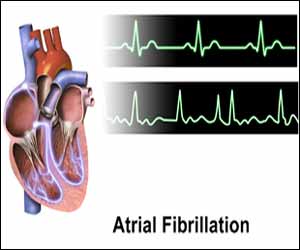- Home
- Editorial
- News
- Practice Guidelines
- Anesthesiology Guidelines
- Cancer Guidelines
- Cardiac Sciences Guidelines
- Critical Care Guidelines
- Dentistry Guidelines
- Dermatology Guidelines
- Diabetes and Endo Guidelines
- Diagnostics Guidelines
- ENT Guidelines
- Featured Practice Guidelines
- Gastroenterology Guidelines
- Geriatrics Guidelines
- Medicine Guidelines
- Nephrology Guidelines
- Neurosciences Guidelines
- Obs and Gynae Guidelines
- Ophthalmology Guidelines
- Orthopaedics Guidelines
- Paediatrics Guidelines
- Psychiatry Guidelines
- Pulmonology Guidelines
- Radiology Guidelines
- Surgery Guidelines
- Urology Guidelines
Height is causal risk factor for Atrial Fibrillation shows Penn Medicine study

Height is a causal risk factor for Atrial Fibrillation is the finding of a Penn Medicine study.
According to a new Penn Medicine study taller people have an increased risk of developing atrial fibrillation (AFib) that can lead to stroke, heart failure and other complications.
The researchers have found that the risk for AFib climbed as one's height increased, with every one-inch increase in height translating to about a three percent increase in risk of Afib--independent of other clinical factors--as compared to those at average height (5 feet and 7 inches).
The research is the among the first to demonstrate that height may be a causal--not correlated--risk factor for AFib. The findings will be presented on Saturday, Nov. 16, at the American Heart Association's 2019 Scientific Sessions in Philadelphia.
"Our findings suggest it may be beneficial to incorporate height into risk-prediction tools for AFib," said the study's lead author Michael Levin, MD, a Cardiovascular Medicine fellow at Penn. "While current guidelines advise against widespread screening for AFib, our findings show that a certain group of patients--specifically, very tall patients--may benefit from screening."
AFib, which affects more than 33 million people worldwide, is a common, abnormal heart rhythm. There are a number of clinical risk factors for developing AFib, including high blood pressure, heart disease, diabetes, and obesity. Observational studies, examining population-level data, have found that taller individuals appear to have a higher risk of developing AFib. However, questions exist about whether height can cause AFib, or if it's just a common, insignificant factor.
To further examine the association between height and Afib, the Penn team leveraged data from the Genetic Investigation of Anthropometric Trials (GIANT) consortium, which studied more than 700,000 individuals to identify genetic variants associated with height. They also examined data from the Atrial Fibrillation Genetics (AFGen) consortium, which studied more than 500,000 individuals to identify genetic variants associated with AFib. The authors employed a statistical method which uses genetics to precisely estimate the relationship between two traits. Their analysis revealed that genetic variants associated with height were also strongly associated with Afib, suggesting that increased height may be a cause of atrial fibrillation. This relationship remained strong even after adjusting for traditional AFib risk factors, like heart disease, high blood pressure, and diabetes, among others.
From there, researchers used a similar statistical method to conduct an individual-level analysis of nearly 7,000 individuals enrolled in the Penn Medicine Biobank. They found that height, and genetic variants associated with height, are strongly associated with an increased risk of AFib, independent from traditional clinical and echocardiographic risk factors.
"These analyses show how we can use human genetics to help us better understand causal risk factors for common disease," said the study's senior author Scott Damrauer, MD, an assistant professor of Surgery at Penn Medicine and a vascular surgeon at the Corporal Michael J. Crescenz VA Medical Center. "They also illustrate how we can combine summary-level statistics from large published studies with individual level data from institutional biobanks to further our understanding of human disease."
For further reference log on to:
American Heart Association's 2019 Scientific Sessions in Philadelphia
Next Story
NO DATA FOUND

Disclaimer: This site is primarily intended for healthcare professionals. Any content/information on this website does not replace the advice of medical and/or health professionals and should not be construed as medical/diagnostic advice/endorsement or prescription. Use of this site is subject to our terms of use, privacy policy, advertisement policy. © 2020 Minerva Medical Treatment Pvt Ltd